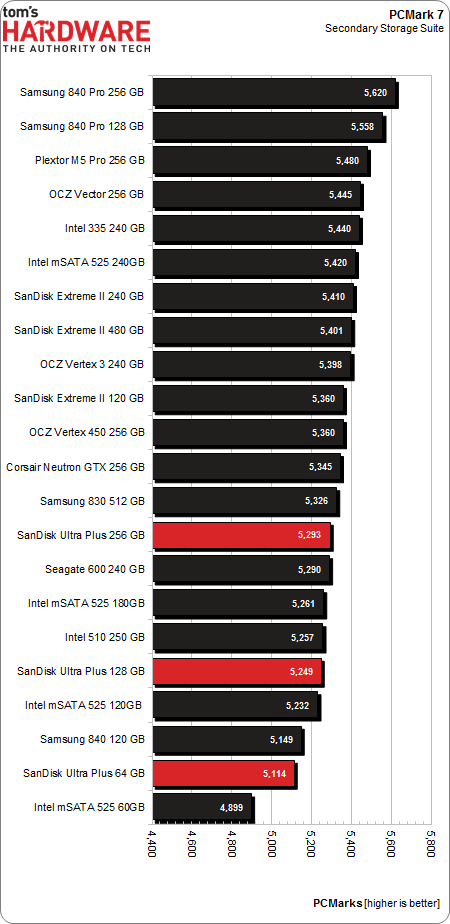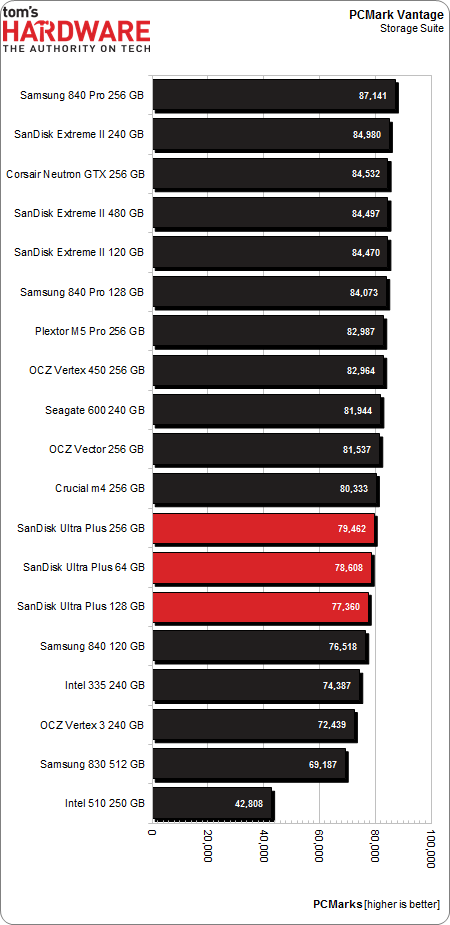SanDisk Ultra Plus SSD Reviewed At 64, 128, And 256 GB
SanDisk's Ultra Plus replaces the company's older SATA 3Gb/s SandForce-based Ultra with something a bit more modern, and with a budget-oriented price tag. We test all three capacities to see if the entry-level pricing belies a pocket rocket in disguise.
Results: PCMark 7 And PCMark Vantage
Futuremark's PCMark 7: Secondary Storage Suite
PCMark 7 uses the same trace-based technology as our Storage Bench v1.0 for its storage suite testing. It employs a geometric mean scoring system to generate a composite, so we end up with PCMarks instead of a megabytes per second. One-thousand points separate the top and bottom, but that encompasses a far larger difference than the score alone indicates.
PCMark 7 is a vast improvement over the older PCMark Vantage, at least for SSD benchmarking. The storage suite is comprised of several small traces. At the end, the geometric mean of those scores is scaled with a number representing the test system's speed. The scores generated are much different from PCMark Vantage, and many manufacturers are predisposed to dislike it for that reason. It's hard to figure out how PCMark 7 "works" because it uses a sliding scale to generate scores. Still, it represents one of the best canned benchmarks for storage, and if nothing else, it helps reinforce the idea that the differences in modern SSD performance don't necessarily amount to a better user experience in average consumer workloads.
Incredibly, the 256 GB Ultra Plus scores just ahead of Seagate's 600. That drive is unquestionably quick, and seeing the Ultra Plus beat it by just three points is good news for SanDisk. Both drives are similar in terms of flash technology, but the LAMD 87800AA controller in Seagate's SSD should have the baby Marvell out-manned and out-gunned. The 128 GB Ultra Plus isn't far behind, and the 64 GB is surprisingly fast.
The Extreme II family improves on the Ultra Plus to be sure, but those faster SanDisks bottom out at 120 GB. If you want a 64/60 GB-class drive, you could do (significantly) worse than the little Ultra Plus.
Futuremark's PCMark Vantage: Hard Drive Suite
PCMark's Vantage isn't the paragon of SSD testing, mainly just because it's old and wasn't designed for the massive performance solid-state technology enables. Intended to exploit the new features in Windows Vista, Vantage was certainly at the forefront of consumer storage benching at the time. Vantage works by taking the geometric mean of composite storage scores and then scaling them a lot like PCMark 7 does. But in Vantage's case, this scaling is achieved by arbitrarily multiplying the geometric sub-score mean by 214.65. That scaling factor is supposed to represent an average test system of the day (a system that's now close to a decade behind the times). PCMark 7 improves on this by creating a unique system-dependent scaling factor and newer trace technology. Why bother including this metric, then? A lot of folks prefer Vantage in spite of or because of the cartoonish scores and widespread adoption. That, and the fact that most every manufacturer uses the aged benchmark in box specs and reviewer-specific guidelines.
Get Tom's Hardware's best news and in-depth reviews, straight to your inbox.
Vantage reads and writes a comparatively small amount of data, and it might be a bit more targeted at 4 KB performance in some instances. Whatever's going on, the three Ultra Plus models are doing it in lock-step. Sure, they score a little better as capacity increases, but the delta between 64 and 256 GB is miniscule to be sure. It looks as though the similar random performance among the trio results in Vantage scores within a whisker of each other. Nice.
Current page: Results: PCMark 7 And PCMark Vantage
Prev Page Results: Tom's Hardware Storage Bench v1.0 Next Page Results: Robocopy File Transfer Performance-
kevith I have had the former SanDisk Extreme 128 GB for a year now, and it´s definitely fast enough. But what´s more impressive is, that after a year, the write amplification still hovers between 0,800 and 0,805. I´m using it in my laptop for quite "normal" use, FB, YouTube, mail, wordprocessing etc.on Windows 8 64-bit. So far it has served me very well, my next SSD is going to be another SanDiskReply -
Soda-88 I recommended this SSD (256GB) to my friend just a week ago since it was nearly as cheap as top of the line 128GB SSDs, glad to read positive review.Reply -
alidan im honestly looking into ssd drives for games and mass small file storage.Reply
these are cheap, and they are large, would definitely help with load times/game performance, and browsing images stored enmass. -
Brian Fulmer I ordered 5 Extreme 128GB drives in March (model SDSSDHP-128G). I've been using OCZ, Kingston, Samsung and Crucial drives in every desktop and notebook I've deployed since August 2013. Out of ~75 drives, I've had 1 bad Vertex 4 and 6 defective by design Crucial V4's. Of the 5 SanDisks, 2 failed before deployment. Support was laughably incompetent in demanding the drives be updated with the latest firmware. Their character mode updater couldn't see the drives, because they DIED. SanDisk is no longer on my buy list.Reply
Incidentally, of the 8 SSD model SSD P5 128GB, I've had one die. The context should be of 35 Vertex 4's, I've had one die. I've had zero failures with 15 840's despite their supposedly fragile design. -
ssdpro Brian Fulmer's comments are very reasonable (except the "deployed since Aug 2013" part lol). Way too many people experience a failure then scream all drives from that mfg are junk. I have owned 2 840 Pro drives and had one fault out. Does that mean Samsung drives have a 50 percent failure rate? For me, yes, but overall no and I am definitely not that naive. The 840 Pro can and do fail like anything electrical can. I have owned probably a dozen OCZ drives and had one Vertex 2 failure - does that mean OCZ/SandForce firmware stinks and they aren't reliable? No, it just means a drive died and who knows why. I have owned a couple SanDisk products and none failed. Does that mean SanDisk is the best? No... it just means I didn't have one die but I also only sampled 2.Reply -
Combat Wombat These and the OCZ drives from newegg are looking mighty close in price!Reply
BF4 Rebuild is about to take place :D -
@ssdpro: spot on. sure, if i buy from vendor a and his product fails, i will probably not buy from him again. if it fails more than once, there is no chance i'll buy his stuff again and i also will warn others about it. but understandable as this is, in the end even that doesn't mean much about the reliability of the manufacturer.Reply
that's also why i'm a bit sceptical about product ratings on amazon and the likes, since people are more inclined to complain about a bad experience, than share their view on a product that simply does what it should do: work.
what we would need more often are statistics from bigger companies, or even repair services, so we don't have to base our purchases on samples of a few dozen to a few hundreds, but on thousands upon thousands of cases. -
flong777 The 840 Pro still appears to be the fastest overall SSD on the planet - but the difference between the top 5 is pretty much negligible. Among the top five, reliability and cost become the determining factors.Reply -
anything4this I don't understand the ~500MBs read limit on the drives. Is it an interface bottleneck?Reply

